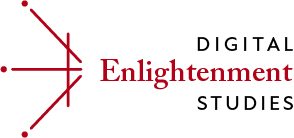We are delighted to launch Digital Enlightenment Studies (DES), an open-access, international, peer-reviewed scholarly journal dedicated to the application and exploration of digital methodologies and resources for the interdisciplinary field of 18th-century studies. We are very grateful to Dan Edelstein for penning the Foreword for this inaugural issue, and indeed to all contributors for joining us in what we hope will be a project that will stimulate research in this area in the years to come.
Over the past decade, if not longer, digital humanities approaches to 18th-century studies have become increasingly conspicuous as a distinct field of research. A growing number of projects, academic positions and curricula are strongly connected with digital studies in the Enlightenment, which have already gained considerable visibility and institutional purchase in the form of conferences, thematic volumes and published monographs. This ongoing development is supported by the rising number and quality of digitally available literary and historical 18th-century text collections and bibliographical databases, as well as by recent developments in computational methods for text analysis.
The launch of DES responds to this increasing availability of digitised and born-digital resources for the study of the Enlightenment and the transnational 18th-century Republic of Letters. The journal provides a publishing platform for various kinds of scholarship: from long-form articles to shorter notes, works in progress, project reports and reviews, all of which touch upon the development, application and critique of digital approaches to the Enlightenment in the broadest sense.
This first issue brings together a range of article types and subject matter. Willard McCarty marshals a vast range of texts and materials to explore from an epistemological perspective how from codex to computer humans have been modelling our own thought process, thus probing the nature of digital humanities as a field. Yann Ryan, Ananth Mahadevan and Mikko Tolonen report on their recent research into how Bernard Mandeville reused his own texts in later writings, as well as his borrowings from others, and theirs from him, thereby bringing into focus the value of text similarity analysis for enhancing our understanding of the evolution, context and influence of literary works. Alicia C. Montoya gives us an early glimpse into how her previous project, MEDIATE, feeds into new research using multiple 18th-century sources of book-related data to gain insights into the impacts of reading fiction at that time.
The three project reports in the current issue showcase new and coming developments in the areas of, respectively, German-language correspondences (Élisabeth Décultot, Portal Der deutsche Brief im 18. Jahrhundert), the navigation of intertextual relationships in a French-language context (Clovis Gladstone, Intertextual Hub), and the circulation and significance of translations of politically radical writings between Italy, France and Britain (Rosa Mucignat and Sanja Perovic, Radical Translations Project). From these three projects alone, we can see both how language is a factor that creates boundaries, and how digital humanities research is engaged in trying to break down those boundaries and find new connections that have eluded traditional scholarship.
Looking ahead, the field of digital Enlightenment studies and the DES journal itself are poised for significant evolution and expansion. There is a clear trajectory towards harnessing more advanced technologies like artificial intelligence and machine learning to deepen our understanding of the Enlightenment period. These technologies have the potential to analyse vast arrays of data at a more nuanced level, uncovering patterns and connections that would be impossible to detect manually. For example, predictive analytics could be employed to hypothesise lost or hidden links between historical figures, texts and networks, while natural language processing could facilitate a more intricate analysis of the linguistic subtleties within primary sources.
We hope that future issues of DES will include research that pushes the boundaries of interdisciplinary research by encouraging collaborations between humanists, digital humanities scholars, data scientists and experts in artificial intelligence. The journal will not shy away from debates around the ethical implications of using digital methodologies in humanities research, an area that requires careful consideration, particularly regarding the authenticity, preservation and digital rights of 18th-century texts and artefacts. As the field grows, DES is committed to fostering discussions too about digital literacy among scholars, ensuring that technological advancements are accessible and comprehensible to a broad academic audience.
We are keen to publish research that emphasises global perspectives and to showcase projects that explore non-Western viewpoints and contributions to the Enlightenment, thereby challenging the traditional Eurocentric framework. Additionally, DES will feature initiatives that aim to make digital tools and primary sources more accessible to researchers and the public alike, championing open-source resources and universal access to knowledge. As the intersection between digital technologies and humanities scholarship continues to strengthen, DES aims to be at the forefront of this exciting interdisciplinary journey, illuminating the past with the digital tools of the future.
DES accepts reviews, both of works in print and also, importantly, of digital tools and resources. The present issue illustrates that with an example of each. Building on the Voltaire Foundation’s long-established publishing expertise, DES welcomes work in both English and French, which in no way limits content to the francophone and anglophone spheres of Enlightenment, however. On the contrary, DES recognises the linguistic and geographic diversity of 18th-century studies and encourages scholars of all literatures and cultures to consider submissions.
We anticipate contributions from both early-career and established scholars in areas such as digital editions, building and exploiting corpora, database construction, linked open data, domain adaptation of methods, operationalisation of concepts, text annotation, and the interpretability, transparency and reproducibility of results. DES encourages submissions addressing all aspects of 18th-century studies approached using digital methods, as well as new 18th-century digital resources. We also welcome feedback from all our authors and readers with ideas and suggestions regarding the development of this journal. We look forward to hearing from you!

